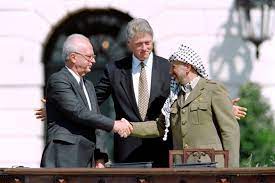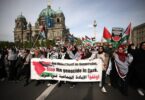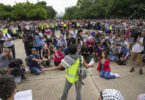Daoud Kuttab
Thirty years on from the signing at the White House of the Declaration of Principles between Israel and the Palestine Liberation Organization, the negative effects of the agreement are most obvious in Jerusalem. The signing of the agreement now referred to as the first of the Oslo Accords followed the exchange of letters of recognition between the PLO and Israel. But this recognition and the interim agreement that followed have proved disastrous for the people of Jerusalem.
Commitments by the US that Israel would respect the status quo evaporated, as Israel closed the PLO headquarters at Orient House in East Jerusalem. Israel used the archaic British Mandate’s emergency regulations to shut out every organization and institute that Israeli intelligence deemed to have any relations with Ramallah and the Palestinian leadership. Not only was the symbolic Orient House forcibly closed, but so was the Chamber of Commerce, the Tourism Council and a number of other institutions. Simple public events like a puppet festival or celebrations to mark the success of a football club or high school graduates have regularly been banned by Israel. The excuse is always that these organizations and events relate to the Palestinian leadership or the Palestinian government.
Israel has also created a more physical barrier. An 8-foot wall with cameras and razor wire has created an ugly and suffocating separation. The wall, built deep in East Jerusalem, separates neighborhoods and communities. Suddenly, vast numbers of Palestinian Jerusalemites have found themselves living beyond the wall. Even though Israel continued to insist on sovereignty in these areas, barring any attempt by Palestinian security or the executive branch to approach them, it totally ignored them. Huge neighborhoods rose, including 15- to 20-story buildings built without any supervision or approval by any competent regulatory body. Crime, drugs and lawlessness skyrocketed as these areas became a haven for criminals trying to avoid both Palestinian and Israeli justice. The only time that Israeli security would enter the areas beyond the wall was when they pursued any Palestinian accused of allegedly causing harm to an Israeli Jew.
The Oslo Accords became a second Nakba (catastrophe) for many Palestinians, who decades earlier saw the city of Jerusalem as the hub of Palestinian political activity. The entire Palestinian delegation to the Madrid peace talks was based in East Jerusalem, with a technical committee operating in various sectors, all under the leadership of the Faisal Husseini-Sari Nusseibeh-Hanan Ashrawi trifecta. All that has now been lost to a chaotic situation, in which hooligans often run the city and personal rights and properties are subject to the law of the jungle.
While Jerusalemites became political orphans, they were waiting for a breakthrough in the peace talks or a more serious intervention in their situation by the Ramallah leadership, but this never materialized. Sure, a Palestinian committee, a governor and even a Cabinet minister exist with the official goal of working for and with Jerusalemites, but in reality, Jerusalem was quickly dropped from the agenda of the Palestinian leadership, which had new priorities, including caring for a bulging security payroll and a huge bureaucracy that was allowed to work in all Palestinian areas except Jerusalem. Even though 35 percent of the Palestinian budget went to security issues, the city Palestinians want to become their future capital was left to fight its own daily battles. For Jerusalemites, the biggest issue has been and continues to be housing. Israel has refused to allow the creation of a zoning plan for the Palestinian city and, as a result, some houses were built without licenses. This building problem brought a new phenomenon in the form of Israel forcing Palestinians to tear down their own homes or face the huge financial penalty of the Israeli government bringing in highly paid, well-protected demolition teams to do it for them.
Israel’s reluctance, in the first days of the occupation, to allow a Palestinian curriculum in Jerusalem’s schools has also come under pressure ever since the Oslo process took shape. Without any mechanism to allow the rise of a political leadership in Jerusalem, the situation seems bleak in the city. Jerusalemites are looking for new political empowerment strategies to deal with some of the critical problems they face, which endanger their continued steadfastness in their homes and on their land. Arab support, which has often been declared at summits, has not always been delivered as promised and some of it has faced obstacles, including the absence of a transparent Palestinian leadership.
Israel’s unilateral annexation of East Jerusalem has complicated the situation for Palestinians, who are now debating whether they can gain some power by participating in the upcoming Oct. 31 municipal elections or if they should continue their decades-long boycott of the poll that brings both East and West Jerusalem into a single electoral process. While Jerusalem is listed as one of five permanent status issues that were supposed to be agreed to within an interim period, those talks have not moved at all and, in fact, they have receded, as successive Israeli governments have escalated the repression and abused the five-year interim period, which has mushroomed into 30 years with no end in sight. For now, the Palestinians have lost all hope that anything good can come out of the Oslo Accords and are instead looking for homegrown strategies to help in the only defense left to them – “sumoud,” or steadfastness.







